Sri Lankan Beauty Standards: Cultural Norms and Marketing
VerifiedAdded on 2023/06/10
|11
|2464
|378
Essay
AI Summary
This essay explores the beauty standards prevalent in Sri Lankan culture, examining the influence of globalization, marketing, and cultural norms on perceptions of beauty. It discusses how beauty is defined differently across cultures and highlights the specific beauty ideals within Sri Lankan so...
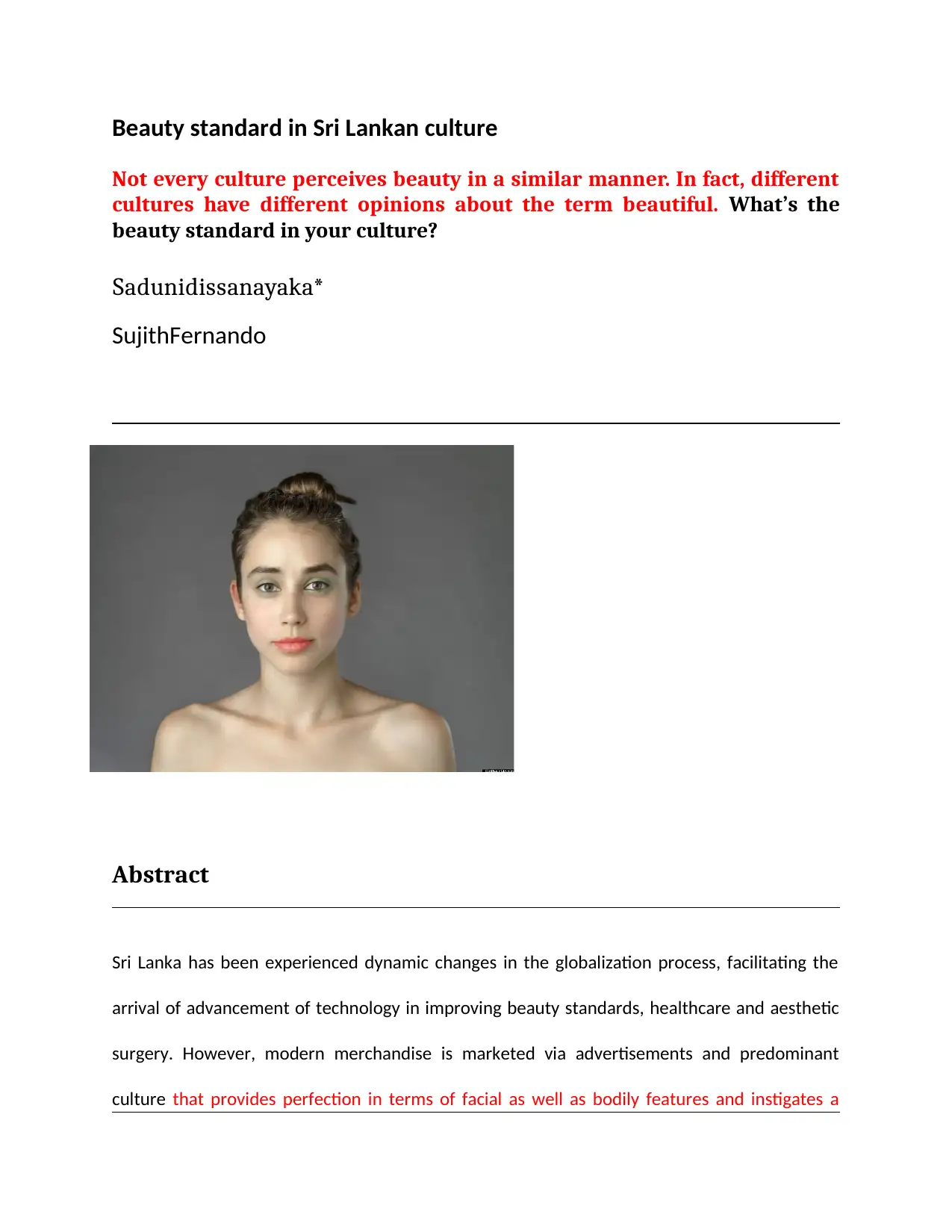
Beauty standard in Sri Lankan culture
Not every culture perceives beauty in a similar manner. In fact, different
cultures have different opinions about the term beautiful. What’s the
beauty standard in your culture?
Sadunidissanayaka*
SujithFernando
Abstract
Sri Lanka has been experienced dynamic changes in the globalization process, facilitating the
arrival of advancement of technology in improving beauty standards, healthcare and aesthetic
surgery. However, modern merchandise is marketed via advertisements and predominant
culture that provides perfection in terms of facial as well as bodily features and instigates a
Not every culture perceives beauty in a similar manner. In fact, different
cultures have different opinions about the term beautiful. What’s the
beauty standard in your culture?
Sadunidissanayaka*
SujithFernando
Abstract
Sri Lanka has been experienced dynamic changes in the globalization process, facilitating the
arrival of advancement of technology in improving beauty standards, healthcare and aesthetic
surgery. However, modern merchandise is marketed via advertisements and predominant
culture that provides perfection in terms of facial as well as bodily features and instigates a
Paraphrase This Document
Need a fresh take? Get an instant paraphrase of this document with our AI Paraphraser
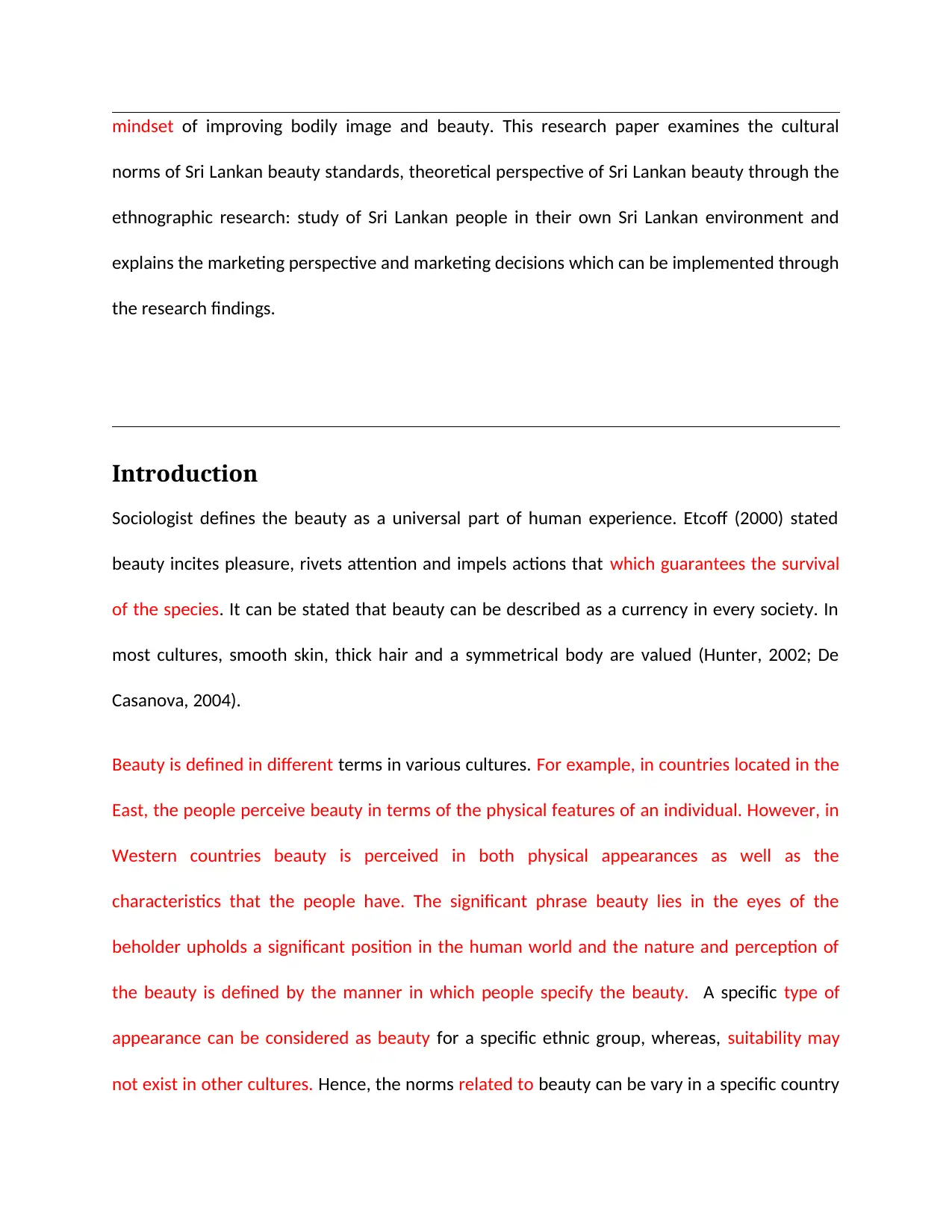
mindset of improving bodily image and beauty. This research paper examines the cultural
norms of Sri Lankan beauty standards, theoretical perspective of Sri Lankan beauty through the
ethnographic research: study of Sri Lankan people in their own Sri Lankan environment and
explains the marketing perspective and marketing decisions which can be implemented through
the research findings.
Introduction
Sociologist defines the beauty as a universal part of human experience. Etcoff (2000) stated
beauty incites pleasure, rivets attention and impels actions that which guarantees the survival
of the species. It can be stated that beauty can be described as a currency in every society. In
most cultures, smooth skin, thick hair and a symmetrical body are valued (Hunter, 2002; De
Casanova, 2004).
Beauty is defined in different terms in various cultures. For example, in countries located in the
East, the people perceive beauty in terms of the physical features of an individual. However, in
Western countries beauty is perceived in both physical appearances as well as the
characteristics that the people have. The significant phrase beauty lies in the eyes of the
beholder upholds a significant position in the human world and the nature and perception of
the beauty is defined by the manner in which people specify the beauty. A specific type of
appearance can be considered as beauty for a specific ethnic group, whereas, suitability may
not exist in other cultures. Hence, the norms related to beauty can be vary in a specific country
norms of Sri Lankan beauty standards, theoretical perspective of Sri Lankan beauty through the
ethnographic research: study of Sri Lankan people in their own Sri Lankan environment and
explains the marketing perspective and marketing decisions which can be implemented through
the research findings.
Introduction
Sociologist defines the beauty as a universal part of human experience. Etcoff (2000) stated
beauty incites pleasure, rivets attention and impels actions that which guarantees the survival
of the species. It can be stated that beauty can be described as a currency in every society. In
most cultures, smooth skin, thick hair and a symmetrical body are valued (Hunter, 2002; De
Casanova, 2004).
Beauty is defined in different terms in various cultures. For example, in countries located in the
East, the people perceive beauty in terms of the physical features of an individual. However, in
Western countries beauty is perceived in both physical appearances as well as the
characteristics that the people have. The significant phrase beauty lies in the eyes of the
beholder upholds a significant position in the human world and the nature and perception of
the beauty is defined by the manner in which people specify the beauty. A specific type of
appearance can be considered as beauty for a specific ethnic group, whereas, suitability may
not exist in other cultures. Hence, the norms related to beauty can be vary in a specific country
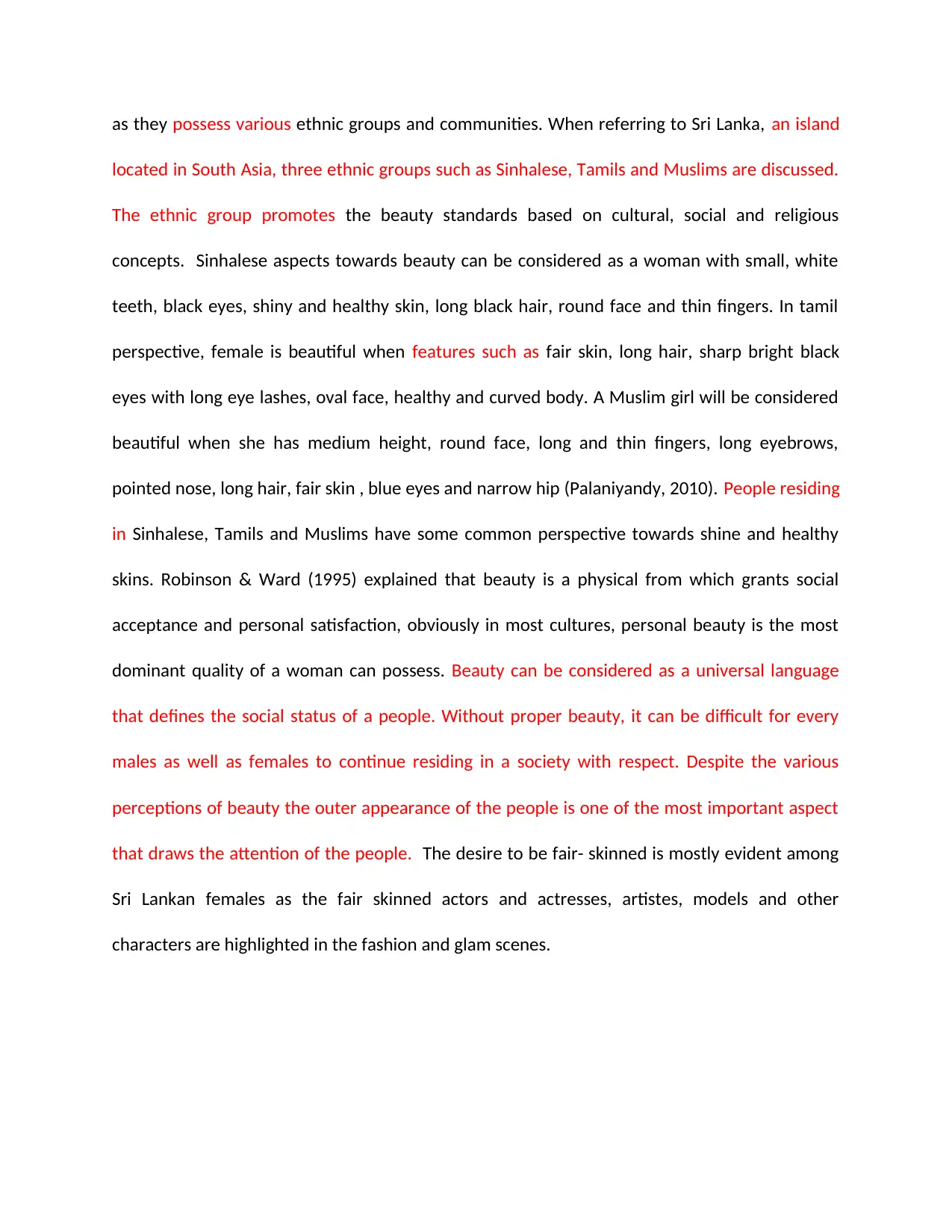
as they possess various ethnic groups and communities. When referring to Sri Lanka, an island
located in South Asia, three ethnic groups such as Sinhalese, Tamils and Muslims are discussed.
The ethnic group promotes the beauty standards based on cultural, social and religious
concepts. Sinhalese aspects towards beauty can be considered as a woman with small, white
teeth, black eyes, shiny and healthy skin, long black hair, round face and thin fingers. In tamil
perspective, female is beautiful when features such as fair skin, long hair, sharp bright black
eyes with long eye lashes, oval face, healthy and curved body. A Muslim girl will be considered
beautiful when she has medium height, round face, long and thin fingers, long eyebrows,
pointed nose, long hair, fair skin , blue eyes and narrow hip (Palaniyandy, 2010). People residing
in Sinhalese, Tamils and Muslims have some common perspective towards shine and healthy
skins. Robinson & Ward (1995) explained that beauty is a physical from which grants social
acceptance and personal satisfaction, obviously in most cultures, personal beauty is the most
dominant quality of a woman can possess. Beauty can be considered as a universal language
that defines the social status of a people. Without proper beauty, it can be difficult for every
males as well as females to continue residing in a society with respect. Despite the various
perceptions of beauty the outer appearance of the people is one of the most important aspect
that draws the attention of the people. The desire to be fair- skinned is mostly evident among
Sri Lankan females as the fair skinned actors and actresses, artistes, models and other
characters are highlighted in the fashion and glam scenes.
located in South Asia, three ethnic groups such as Sinhalese, Tamils and Muslims are discussed.
The ethnic group promotes the beauty standards based on cultural, social and religious
concepts. Sinhalese aspects towards beauty can be considered as a woman with small, white
teeth, black eyes, shiny and healthy skin, long black hair, round face and thin fingers. In tamil
perspective, female is beautiful when features such as fair skin, long hair, sharp bright black
eyes with long eye lashes, oval face, healthy and curved body. A Muslim girl will be considered
beautiful when she has medium height, round face, long and thin fingers, long eyebrows,
pointed nose, long hair, fair skin , blue eyes and narrow hip (Palaniyandy, 2010). People residing
in Sinhalese, Tamils and Muslims have some common perspective towards shine and healthy
skins. Robinson & Ward (1995) explained that beauty is a physical from which grants social
acceptance and personal satisfaction, obviously in most cultures, personal beauty is the most
dominant quality of a woman can possess. Beauty can be considered as a universal language
that defines the social status of a people. Without proper beauty, it can be difficult for every
males as well as females to continue residing in a society with respect. Despite the various
perceptions of beauty the outer appearance of the people is one of the most important aspect
that draws the attention of the people. The desire to be fair- skinned is mostly evident among
Sri Lankan females as the fair skinned actors and actresses, artistes, models and other
characters are highlighted in the fashion and glam scenes.
⊘ This is a preview!⊘
Do you want full access?
Subscribe today to unlock all pages.

Trusted by 1+ million students worldwide
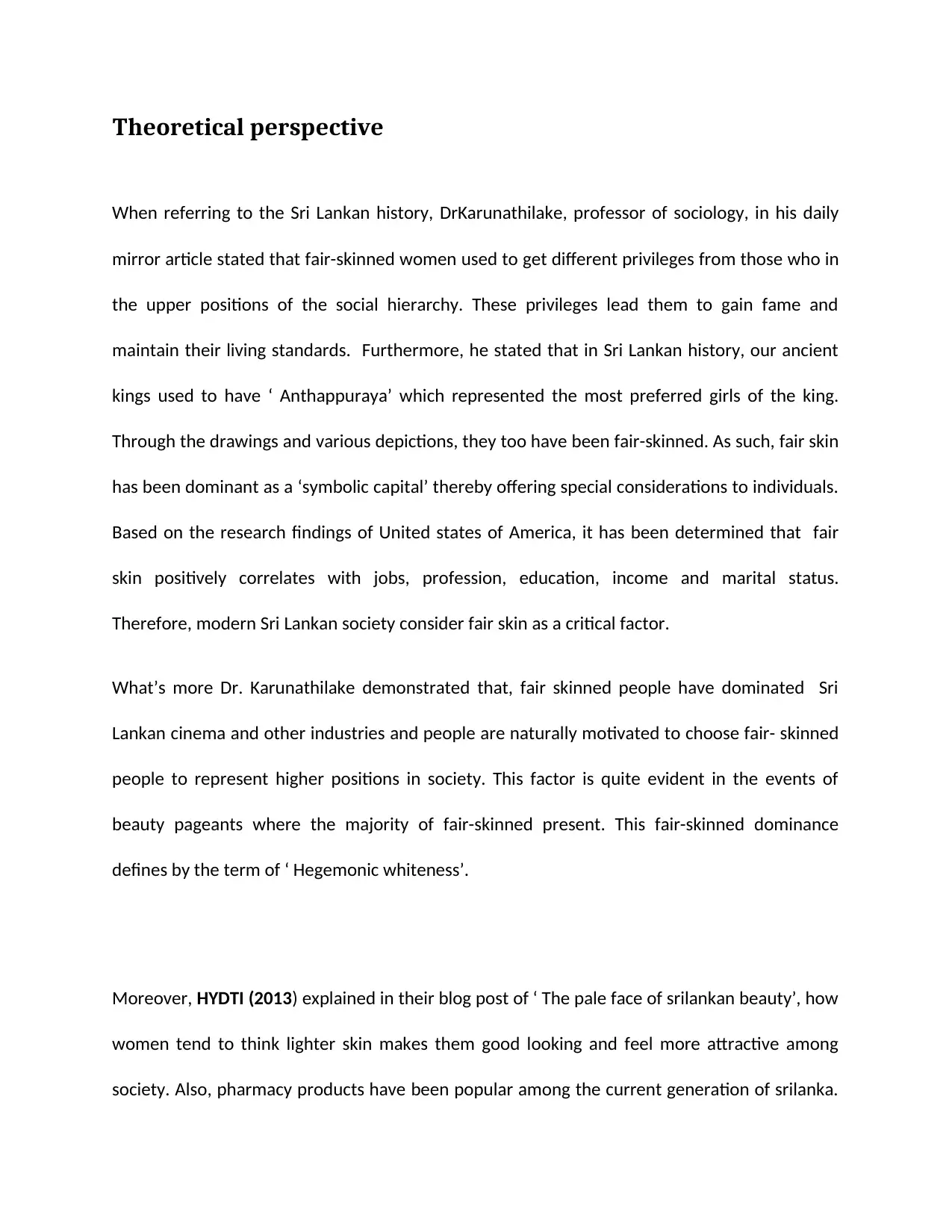
Theoretical perspective
When referring to the Sri Lankan history, DrKarunathilake, professor of sociology, in his daily
mirror article stated that fair-skinned women used to get different privileges from those who in
the upper positions of the social hierarchy. These privileges lead them to gain fame and
maintain their living standards. Furthermore, he stated that in Sri Lankan history, our ancient
kings used to have ‘ Anthappuraya’ which represented the most preferred girls of the king.
Through the drawings and various depictions, they too have been fair-skinned. As such, fair skin
has been dominant as a ‘symbolic capital’ thereby offering special considerations to individuals.
Based on the research findings of United states of America, it has been determined that fair
skin positively correlates with jobs, profession, education, income and marital status.
Therefore, modern Sri Lankan society consider fair skin as a critical factor.
What’s more Dr. Karunathilake demonstrated that, fair skinned people have dominated Sri
Lankan cinema and other industries and people are naturally motivated to choose fair- skinned
people to represent higher positions in society. This factor is quite evident in the events of
beauty pageants where the majority of fair-skinned present. This fair-skinned dominance
defines by the term of ‘ Hegemonic whiteness’.
Moreover, HYDTI (2013) explained in their blog post of ‘ The pale face of srilankan beauty’, how
women tend to think lighter skin makes them good looking and feel more attractive among
society. Also, pharmacy products have been popular among the current generation of srilanka.
When referring to the Sri Lankan history, DrKarunathilake, professor of sociology, in his daily
mirror article stated that fair-skinned women used to get different privileges from those who in
the upper positions of the social hierarchy. These privileges lead them to gain fame and
maintain their living standards. Furthermore, he stated that in Sri Lankan history, our ancient
kings used to have ‘ Anthappuraya’ which represented the most preferred girls of the king.
Through the drawings and various depictions, they too have been fair-skinned. As such, fair skin
has been dominant as a ‘symbolic capital’ thereby offering special considerations to individuals.
Based on the research findings of United states of America, it has been determined that fair
skin positively correlates with jobs, profession, education, income and marital status.
Therefore, modern Sri Lankan society consider fair skin as a critical factor.
What’s more Dr. Karunathilake demonstrated that, fair skinned people have dominated Sri
Lankan cinema and other industries and people are naturally motivated to choose fair- skinned
people to represent higher positions in society. This factor is quite evident in the events of
beauty pageants where the majority of fair-skinned present. This fair-skinned dominance
defines by the term of ‘ Hegemonic whiteness’.
Moreover, HYDTI (2013) explained in their blog post of ‘ The pale face of srilankan beauty’, how
women tend to think lighter skin makes them good looking and feel more attractive among
society. Also, pharmacy products have been popular among the current generation of srilanka.
Paraphrase This Document
Need a fresh take? Get an instant paraphrase of this document with our AI Paraphraser
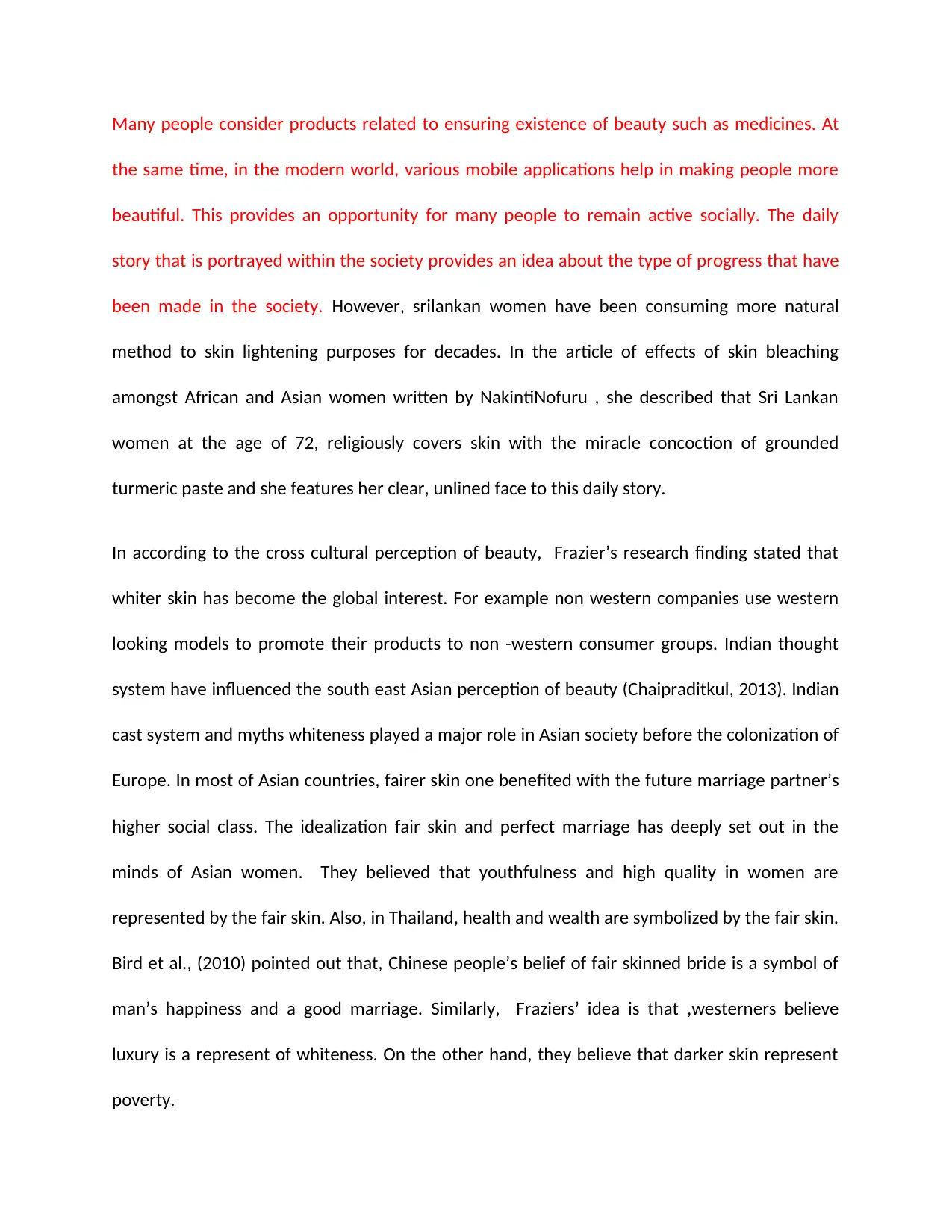
Many people consider products related to ensuring existence of beauty such as medicines. At
the same time, in the modern world, various mobile applications help in making people more
beautiful. This provides an opportunity for many people to remain active socially. The daily
story that is portrayed within the society provides an idea about the type of progress that have
been made in the society. However, srilankan women have been consuming more natural
method to skin lightening purposes for decades. In the article of effects of skin bleaching
amongst African and Asian women written by NakintiNofuru , she described that Sri Lankan
women at the age of 72, religiously covers skin with the miracle concoction of grounded
turmeric paste and she features her clear, unlined face to this daily story.
In according to the cross cultural perception of beauty, Frazier’s research finding stated that
whiter skin has become the global interest. For example non western companies use western
looking models to promote their products to non -western consumer groups. Indian thought
system have influenced the south east Asian perception of beauty (Chaipraditkul, 2013). Indian
cast system and myths whiteness played a major role in Asian society before the colonization of
Europe. In most of Asian countries, fairer skin one benefited with the future marriage partner’s
higher social class. The idealization fair skin and perfect marriage has deeply set out in the
minds of Asian women. They believed that youthfulness and high quality in women are
represented by the fair skin. Also, in Thailand, health and wealth are symbolized by the fair skin.
Bird et al., (2010) pointed out that, Chinese people’s belief of fair skinned bride is a symbol of
man’s happiness and a good marriage. Similarly, Fraziers’ idea is that ,westerners believe
luxury is a represent of whiteness. On the other hand, they believe that darker skin represent
poverty.
the same time, in the modern world, various mobile applications help in making people more
beautiful. This provides an opportunity for many people to remain active socially. The daily
story that is portrayed within the society provides an idea about the type of progress that have
been made in the society. However, srilankan women have been consuming more natural
method to skin lightening purposes for decades. In the article of effects of skin bleaching
amongst African and Asian women written by NakintiNofuru , she described that Sri Lankan
women at the age of 72, religiously covers skin with the miracle concoction of grounded
turmeric paste and she features her clear, unlined face to this daily story.
In according to the cross cultural perception of beauty, Frazier’s research finding stated that
whiter skin has become the global interest. For example non western companies use western
looking models to promote their products to non -western consumer groups. Indian thought
system have influenced the south east Asian perception of beauty (Chaipraditkul, 2013). Indian
cast system and myths whiteness played a major role in Asian society before the colonization of
Europe. In most of Asian countries, fairer skin one benefited with the future marriage partner’s
higher social class. The idealization fair skin and perfect marriage has deeply set out in the
minds of Asian women. They believed that youthfulness and high quality in women are
represented by the fair skin. Also, in Thailand, health and wealth are symbolized by the fair skin.
Bird et al., (2010) pointed out that, Chinese people’s belief of fair skinned bride is a symbol of
man’s happiness and a good marriage. Similarly, Fraziers’ idea is that ,westerners believe
luxury is a represent of whiteness. On the other hand, they believe that darker skin represent
poverty.
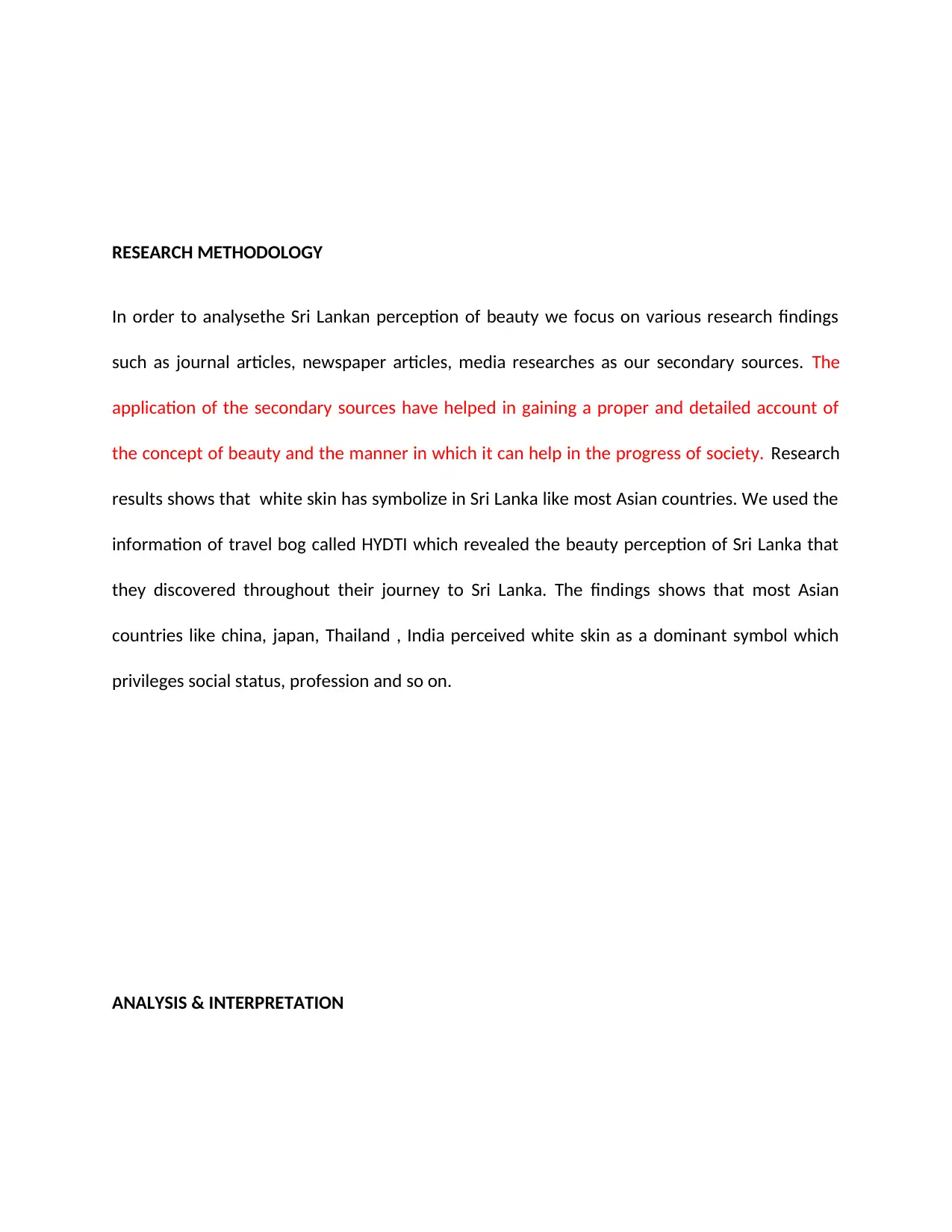
RESEARCH METHODOLOGY
In order to analysethe Sri Lankan perception of beauty we focus on various research findings
such as journal articles, newspaper articles, media researches as our secondary sources. The
application of the secondary sources have helped in gaining a proper and detailed account of
the concept of beauty and the manner in which it can help in the progress of society. Research
results shows that white skin has symbolize in Sri Lanka like most Asian countries. We used the
information of travel bog called HYDTI which revealed the beauty perception of Sri Lanka that
they discovered throughout their journey to Sri Lanka. The findings shows that most Asian
countries like china, japan, Thailand , India perceived white skin as a dominant symbol which
privileges social status, profession and so on.
ANALYSIS & INTERPRETATION
In order to analysethe Sri Lankan perception of beauty we focus on various research findings
such as journal articles, newspaper articles, media researches as our secondary sources. The
application of the secondary sources have helped in gaining a proper and detailed account of
the concept of beauty and the manner in which it can help in the progress of society. Research
results shows that white skin has symbolize in Sri Lanka like most Asian countries. We used the
information of travel bog called HYDTI which revealed the beauty perception of Sri Lanka that
they discovered throughout their journey to Sri Lanka. The findings shows that most Asian
countries like china, japan, Thailand , India perceived white skin as a dominant symbol which
privileges social status, profession and so on.
ANALYSIS & INTERPRETATION
⊘ This is a preview!⊘
Do you want full access?
Subscribe today to unlock all pages.

Trusted by 1+ million students worldwide
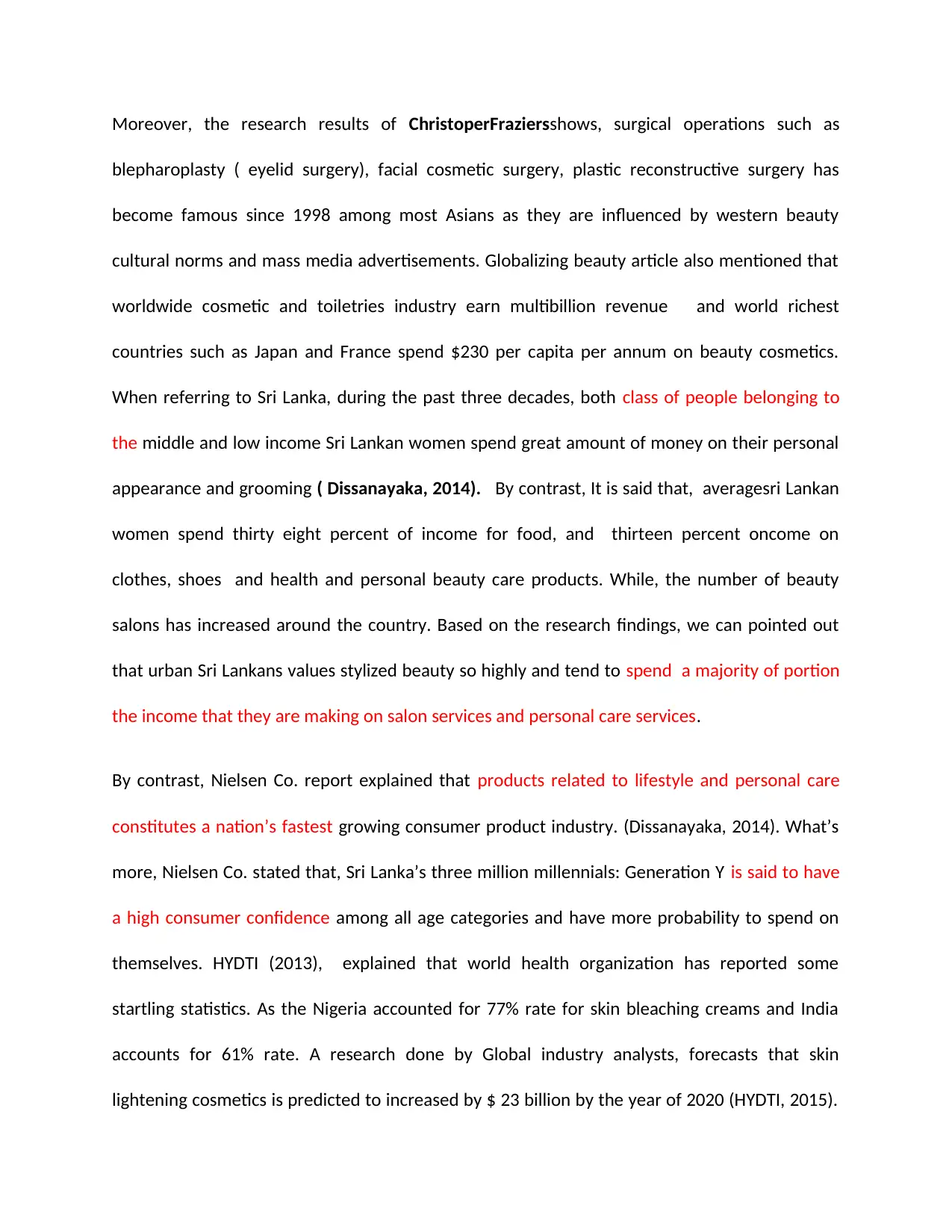
Moreover, the research results of ChristoperFraziersshows, surgical operations such as
blepharoplasty ( eyelid surgery), facial cosmetic surgery, plastic reconstructive surgery has
become famous since 1998 among most Asians as they are influenced by western beauty
cultural norms and mass media advertisements. Globalizing beauty article also mentioned that
worldwide cosmetic and toiletries industry earn multibillion revenue and world richest
countries such as Japan and France spend $230 per capita per annum on beauty cosmetics.
When referring to Sri Lanka, during the past three decades, both class of people belonging to
the middle and low income Sri Lankan women spend great amount of money on their personal
appearance and grooming ( Dissanayaka, 2014). By contrast, It is said that, averagesri Lankan
women spend thirty eight percent of income for food, and thirteen percent oncome on
clothes, shoes and health and personal beauty care products. While, the number of beauty
salons has increased around the country. Based on the research findings, we can pointed out
that urban Sri Lankans values stylized beauty so highly and tend to spend a majority of portion
the income that they are making on salon services and personal care services.
By contrast, Nielsen Co. report explained that products related to lifestyle and personal care
constitutes a nation’s fastest growing consumer product industry. (Dissanayaka, 2014). What’s
more, Nielsen Co. stated that, Sri Lanka’s three million millennials: Generation Y is said to have
a high consumer confidence among all age categories and have more probability to spend on
themselves. HYDTI (2013), explained that world health organization has reported some
startling statistics. As the Nigeria accounted for 77% rate for skin bleaching creams and India
accounts for 61% rate. A research done by Global industry analysts, forecasts that skin
lightening cosmetics is predicted to increased by $ 23 billion by the year of 2020 (HYDTI, 2015).
blepharoplasty ( eyelid surgery), facial cosmetic surgery, plastic reconstructive surgery has
become famous since 1998 among most Asians as they are influenced by western beauty
cultural norms and mass media advertisements. Globalizing beauty article also mentioned that
worldwide cosmetic and toiletries industry earn multibillion revenue and world richest
countries such as Japan and France spend $230 per capita per annum on beauty cosmetics.
When referring to Sri Lanka, during the past three decades, both class of people belonging to
the middle and low income Sri Lankan women spend great amount of money on their personal
appearance and grooming ( Dissanayaka, 2014). By contrast, It is said that, averagesri Lankan
women spend thirty eight percent of income for food, and thirteen percent oncome on
clothes, shoes and health and personal beauty care products. While, the number of beauty
salons has increased around the country. Based on the research findings, we can pointed out
that urban Sri Lankans values stylized beauty so highly and tend to spend a majority of portion
the income that they are making on salon services and personal care services.
By contrast, Nielsen Co. report explained that products related to lifestyle and personal care
constitutes a nation’s fastest growing consumer product industry. (Dissanayaka, 2014). What’s
more, Nielsen Co. stated that, Sri Lanka’s three million millennials: Generation Y is said to have
a high consumer confidence among all age categories and have more probability to spend on
themselves. HYDTI (2013), explained that world health organization has reported some
startling statistics. As the Nigeria accounted for 77% rate for skin bleaching creams and India
accounts for 61% rate. A research done by Global industry analysts, forecasts that skin
lightening cosmetics is predicted to increased by $ 23 billion by the year of 2020 (HYDTI, 2015).
Paraphrase This Document
Need a fresh take? Get an instant paraphrase of this document with our AI Paraphraser
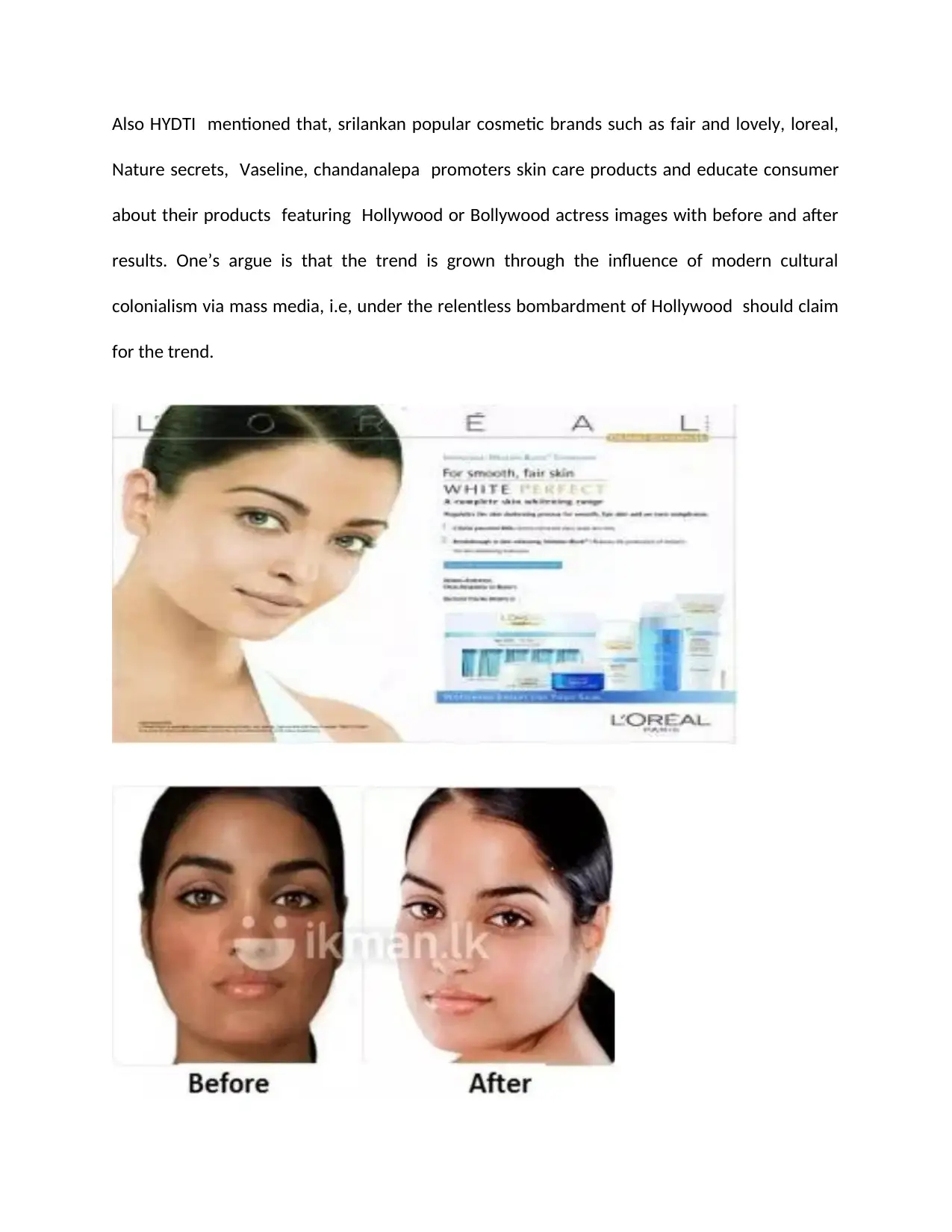
Also HYDTI mentioned that, srilankan popular cosmetic brands such as fair and lovely, loreal,
Nature secrets, Vaseline, chandanalepa promoters skin care products and educate consumer
about their products featuring Hollywood or Bollywood actress images with before and after
results. One’s argue is that the trend is grown through the influence of modern cultural
colonialism via mass media, i.e, under the relentless bombardment of Hollywood should claim
for the trend.
Nature secrets, Vaseline, chandanalepa promoters skin care products and educate consumer
about their products featuring Hollywood or Bollywood actress images with before and after
results. One’s argue is that the trend is grown through the influence of modern cultural
colonialism via mass media, i.e, under the relentless bombardment of Hollywood should claim
for the trend.
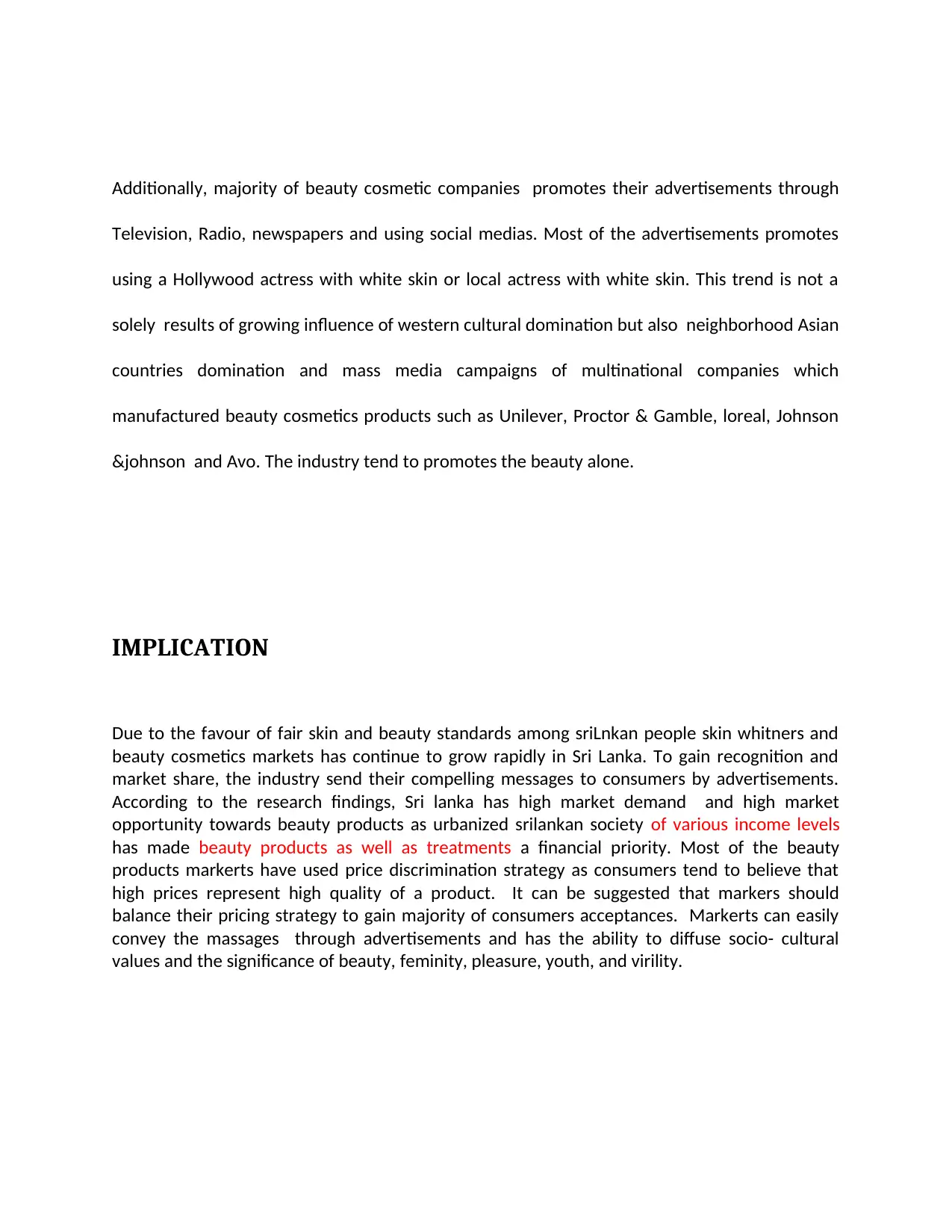
Additionally, majority of beauty cosmetic companies promotes their advertisements through
Television, Radio, newspapers and using social medias. Most of the advertisements promotes
using a Hollywood actress with white skin or local actress with white skin. This trend is not a
solely results of growing influence of western cultural domination but also neighborhood Asian
countries domination and mass media campaigns of multinational companies which
manufactured beauty cosmetics products such as Unilever, Proctor & Gamble, loreal, Johnson
&johnson and Avo. The industry tend to promotes the beauty alone.
IMPLICATION
Due to the favour of fair skin and beauty standards among sriLnkan people skin whitners and
beauty cosmetics markets has continue to grow rapidly in Sri Lanka. To gain recognition and
market share, the industry send their compelling messages to consumers by advertisements.
According to the research findings, Sri lanka has high market demand and high market
opportunity towards beauty products as urbanized srilankan society of various income levels
has made beauty products as well as treatments a financial priority. Most of the beauty
products markerts have used price discrimination strategy as consumers tend to believe that
high prices represent high quality of a product. It can be suggested that markers should
balance their pricing strategy to gain majority of consumers acceptances. Markerts can easily
convey the massages through advertisements and has the ability to diffuse socio- cultural
values and the significance of beauty, feminity, pleasure, youth, and virility.
Television, Radio, newspapers and using social medias. Most of the advertisements promotes
using a Hollywood actress with white skin or local actress with white skin. This trend is not a
solely results of growing influence of western cultural domination but also neighborhood Asian
countries domination and mass media campaigns of multinational companies which
manufactured beauty cosmetics products such as Unilever, Proctor & Gamble, loreal, Johnson
&johnson and Avo. The industry tend to promotes the beauty alone.
IMPLICATION
Due to the favour of fair skin and beauty standards among sriLnkan people skin whitners and
beauty cosmetics markets has continue to grow rapidly in Sri Lanka. To gain recognition and
market share, the industry send their compelling messages to consumers by advertisements.
According to the research findings, Sri lanka has high market demand and high market
opportunity towards beauty products as urbanized srilankan society of various income levels
has made beauty products as well as treatments a financial priority. Most of the beauty
products markerts have used price discrimination strategy as consumers tend to believe that
high prices represent high quality of a product. It can be suggested that markers should
balance their pricing strategy to gain majority of consumers acceptances. Markerts can easily
convey the massages through advertisements and has the ability to diffuse socio- cultural
values and the significance of beauty, feminity, pleasure, youth, and virility.
⊘ This is a preview!⊘
Do you want full access?
Subscribe today to unlock all pages.

Trusted by 1+ million students worldwide
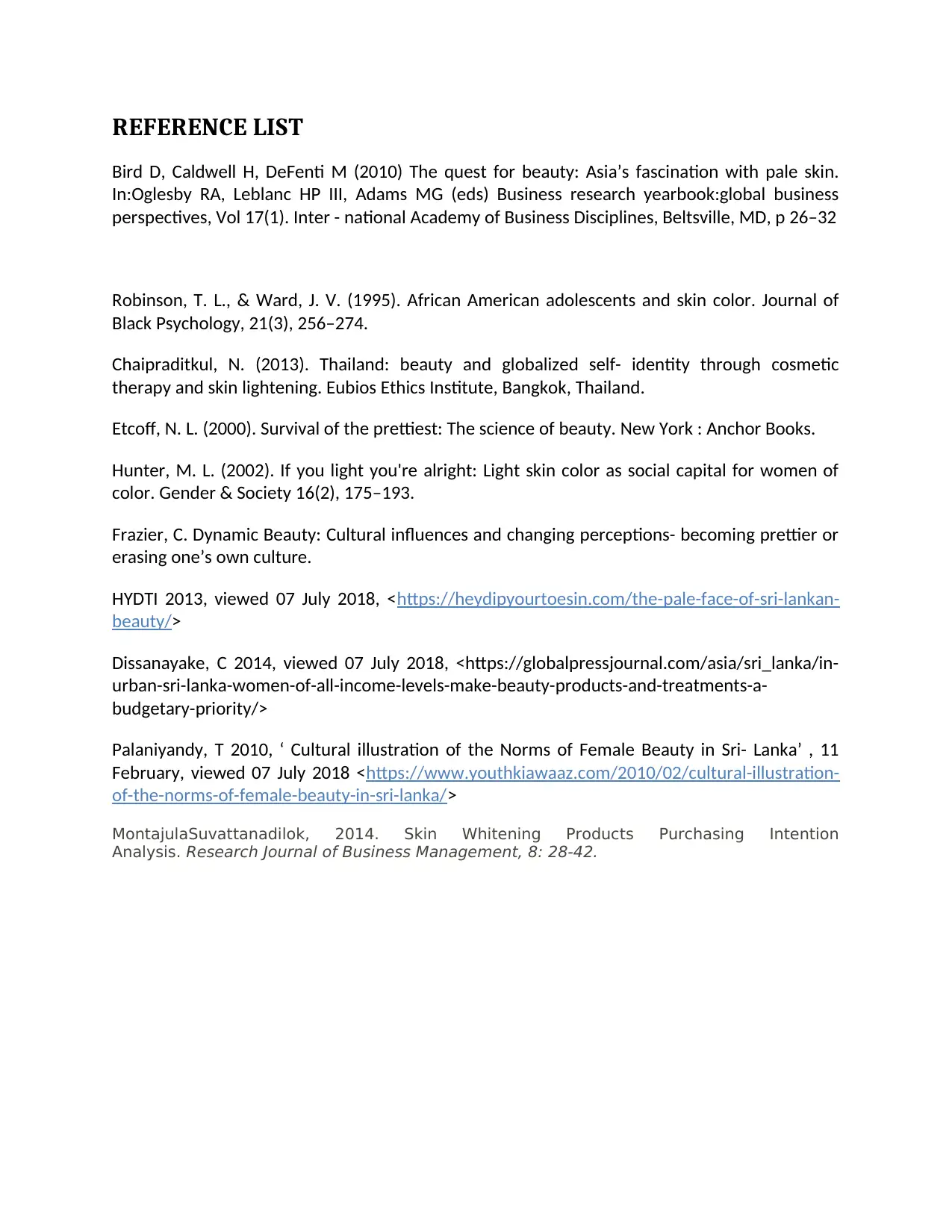
REFERENCE LIST
Bird D, Caldwell H, DeFenti M (2010) The quest for beauty: Asia’s fascination with pale skin.
In:Oglesby RA, Leblanc HP III, Adams MG (eds) Business research yearbook:global business
perspectives, Vol 17(1). Inter - national Academy of Business Disciplines, Beltsville, MD, p 26–32
Robinson, T. L., & Ward, J. V. (1995). African American adolescents and skin color. Journal of
Black Psychology, 21(3), 256–274.
Chaipraditkul, N. (2013). Thailand: beauty and globalized self- identity through cosmetic
therapy and skin lightening. Eubios Ethics Institute, Bangkok, Thailand.
Etcoff, N. L. (2000). Survival of the prettiest: The science of beauty. New York : Anchor Books.
Hunter, M. L. (2002). If you light you're alright: Light skin color as social capital for women of
color. Gender & Society 16(2), 175–193.
Frazier, C. Dynamic Beauty: Cultural influences and changing perceptions- becoming prettier or
erasing one’s own culture.
HYDTI 2013, viewed 07 July 2018, <https://heydipyourtoesin.com/the-pale-face-of-sri-lankan-
beauty/>
Dissanayake, C 2014, viewed 07 July 2018, <https://globalpressjournal.com/asia/sri_lanka/in-
urban-sri-lanka-women-of-all-income-levels-make-beauty-products-and-treatments-a-
budgetary-priority/>
Palaniyandy, T 2010, ‘ Cultural illustration of the Norms of Female Beauty in Sri- Lanka’ , 11
February, viewed 07 July 2018 <https://www.youthkiawaaz.com/2010/02/cultural-illustration-
of-the-norms-of-female-beauty-in-sri-lanka/>
MontajulaSuvattanadilok, 2014. Skin Whitening Products Purchasing Intention
Analysis. Research Journal of Business Management, 8: 28-42.
Bird D, Caldwell H, DeFenti M (2010) The quest for beauty: Asia’s fascination with pale skin.
In:Oglesby RA, Leblanc HP III, Adams MG (eds) Business research yearbook:global business
perspectives, Vol 17(1). Inter - national Academy of Business Disciplines, Beltsville, MD, p 26–32
Robinson, T. L., & Ward, J. V. (1995). African American adolescents and skin color. Journal of
Black Psychology, 21(3), 256–274.
Chaipraditkul, N. (2013). Thailand: beauty and globalized self- identity through cosmetic
therapy and skin lightening. Eubios Ethics Institute, Bangkok, Thailand.
Etcoff, N. L. (2000). Survival of the prettiest: The science of beauty. New York : Anchor Books.
Hunter, M. L. (2002). If you light you're alright: Light skin color as social capital for women of
color. Gender & Society 16(2), 175–193.
Frazier, C. Dynamic Beauty: Cultural influences and changing perceptions- becoming prettier or
erasing one’s own culture.
HYDTI 2013, viewed 07 July 2018, <https://heydipyourtoesin.com/the-pale-face-of-sri-lankan-
beauty/>
Dissanayake, C 2014, viewed 07 July 2018, <https://globalpressjournal.com/asia/sri_lanka/in-
urban-sri-lanka-women-of-all-income-levels-make-beauty-products-and-treatments-a-
budgetary-priority/>
Palaniyandy, T 2010, ‘ Cultural illustration of the Norms of Female Beauty in Sri- Lanka’ , 11
February, viewed 07 July 2018 <https://www.youthkiawaaz.com/2010/02/cultural-illustration-
of-the-norms-of-female-beauty-in-sri-lanka/>
MontajulaSuvattanadilok, 2014. Skin Whitening Products Purchasing Intention
Analysis. Research Journal of Business Management, 8: 28-42.
Paraphrase This Document
Need a fresh take? Get an instant paraphrase of this document with our AI Paraphraser

1 out of 11
Your All-in-One AI-Powered Toolkit for Academic Success.
+13062052269
info@desklib.com
Available 24*7 on WhatsApp / Email
![[object Object]](/_next/static/media/star-bottom.7253800d.svg)
Unlock your academic potential
© 2024 | Zucol Services PVT LTD | All rights reserved.